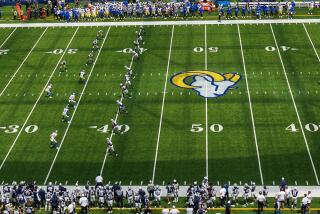In BCS, Routs Now Pointless
- Share via
College football teams will no longer be rewarded for running up the score against overmatched opponents, and more importance will be placed on strength of schedule as the result of changes announced Tuesday in the bowl championship series ratings formula.
Michael Tranghese, BCS coordinator and Big East Conference commissioner, said the margin-of-victory component in the computer polls would be eliminated and the quality-win component would be reduced to teams in the top 10 of the BCS rankings. Previously, victories over teams in the top 15 counted as quality wins.
Tranghese said he hoped the changes, which take effect this fall, would create a fairer system for determining which teams meet in the national championship game.
The margin-of-victory component came under fire last season after Oregon, ranked second in the coaches’ and media polls, was denied a spot in the national title game because the Ducks had finished No. 4 in the final BCS rankings. Oregon, which won several close games, ranked only seventh in the four computers that considered margin of victory.
“Strength of schedule is a more valuable measuring tool than margin of victory,” Tranghese said. “A computer can’t get at the nuances of margin of victory.... I thought it was being given too much weight.”
Tranghese sent a letter last week to computer operators informing them that they would have to remove margin of victory from their systems as a condition of remaining in the BCS formula. Two of the four operators who used the component--Peter Wolfe and Jeff Sagarin--said they would comply with the edict. The other two--David Rothman and Herman Matthews of Scripps-Howard--refused to change their formulas and are out of the BCS.
In explaining his position, Los Angeles-based Rothman said in a statement, “The current efforts to remove margin of victory are only going to degrade the computer’s image, as human participants will continue to do the best they can, utilizing all information that can be ascertained, including margins.”
But Tranghese said he didn’t want a coach with a comfortable lead “trying to figure out if he should score another touchdown because it might help him get in the national championship game.”
Seven computers will be used next season among the four elements in the BCS formula, which also incorporates coaches’ and media polls, strength of schedule and team records. The New York Times will be added to the computer lineup, which will have one fewer computer than last season because of the two dropouts.
When the weekly BCS compilations begin Oct. 21, each team’s worst computer ranking will be discarded and an average of the six other computer ratings will be used.
In response to college football’s increase to a 12-game regular season in 2002 instead of the usual 11, Tranghese said teams would need a 9-3 record and a top-12 ranking in the final BCS standings to be eligible for one of the four BCS games--the Rose, Fiesta, Sugar and Orange bowls.
The Fiesta Bowl plays host to the national championship game on Jan. 3.
More to Read
Go beyond the scoreboard
Get the latest on L.A.'s teams in the daily Sports Report newsletter.
You may occasionally receive promotional content from the Los Angeles Times.










